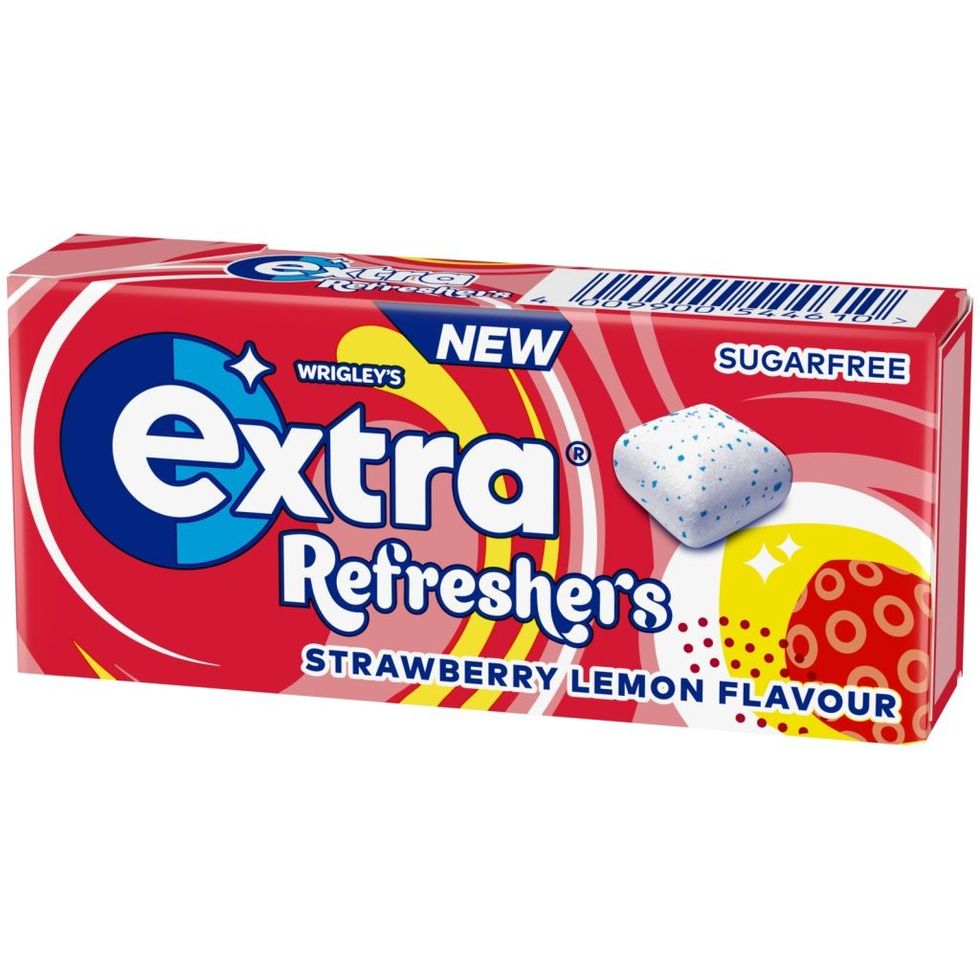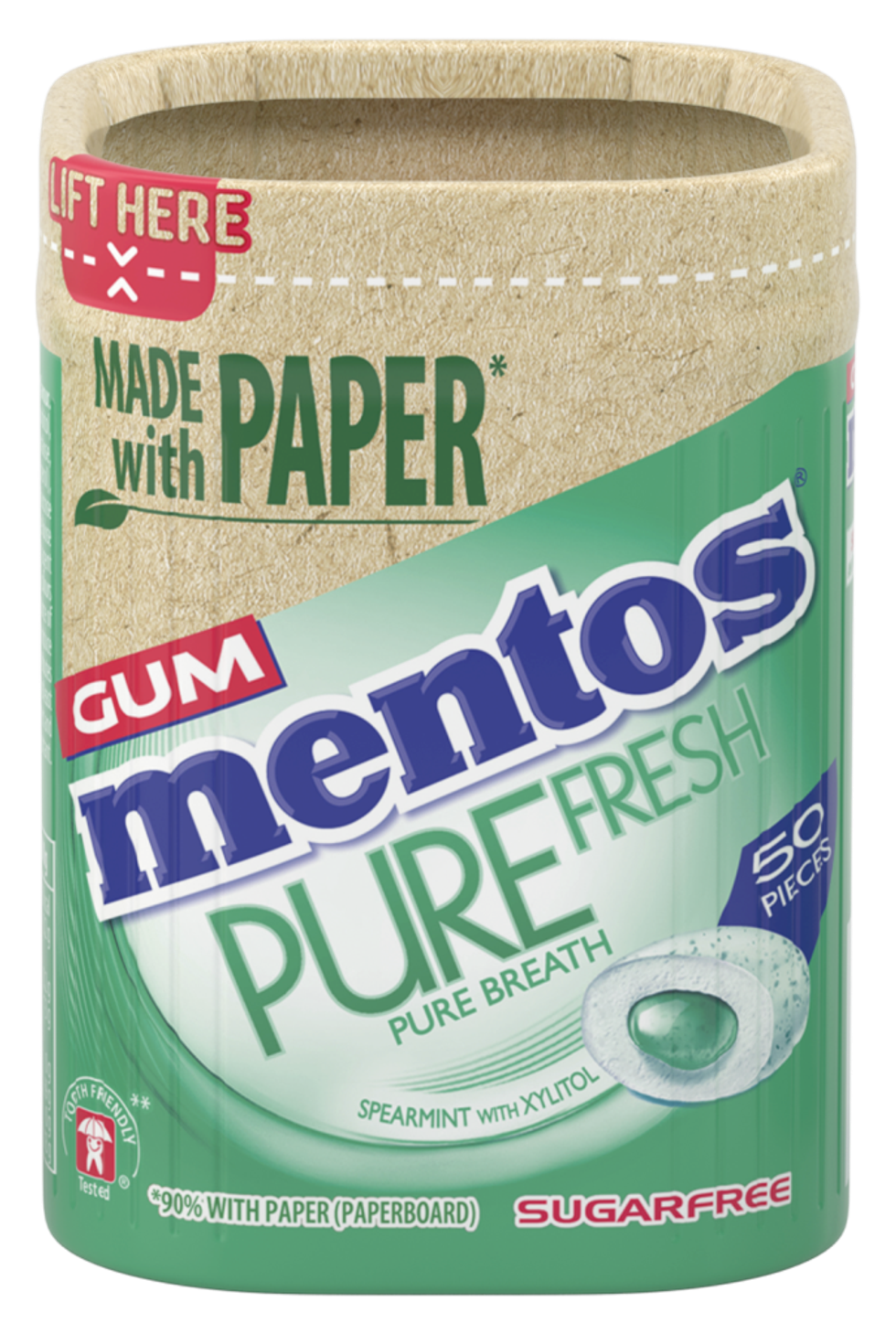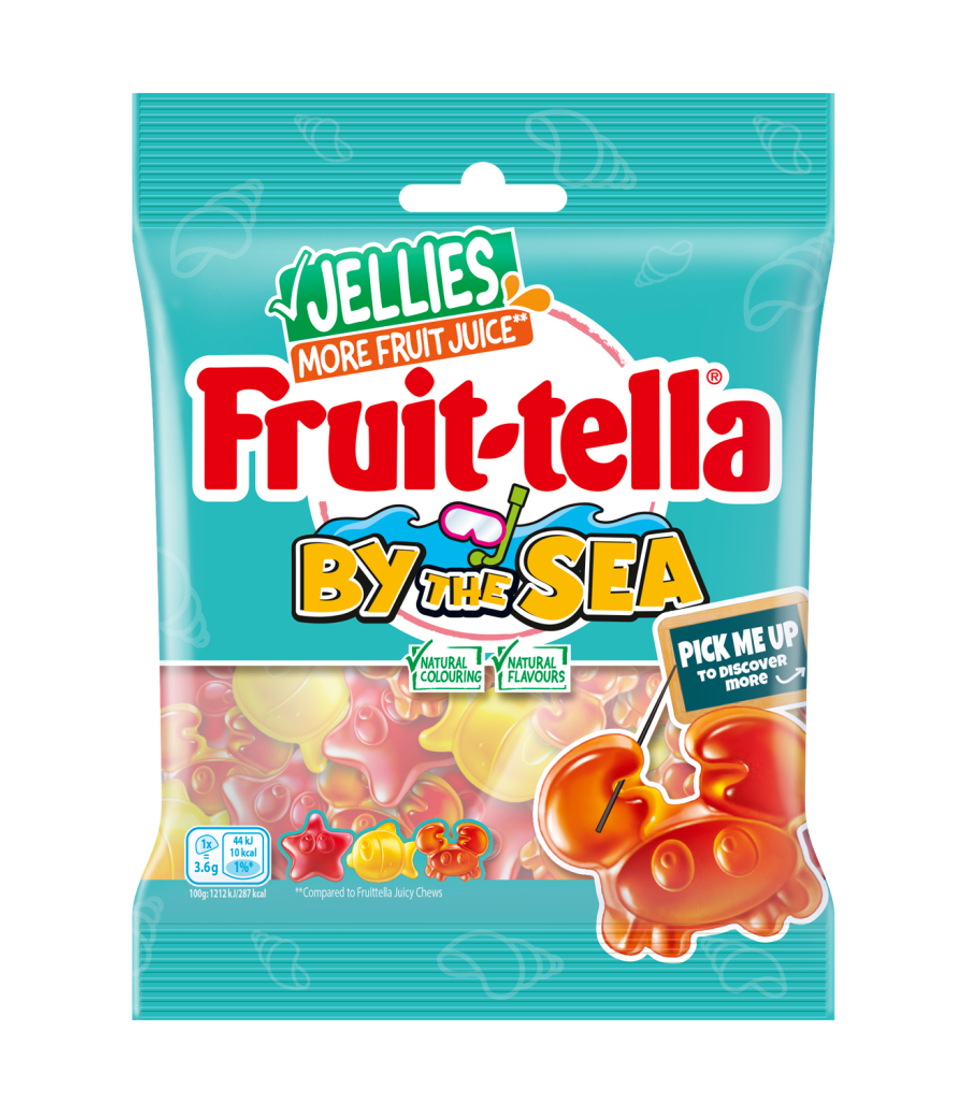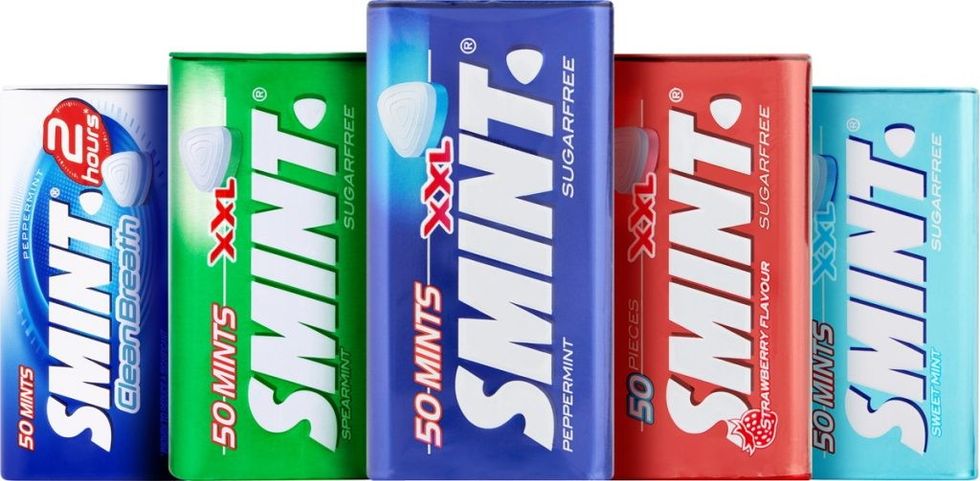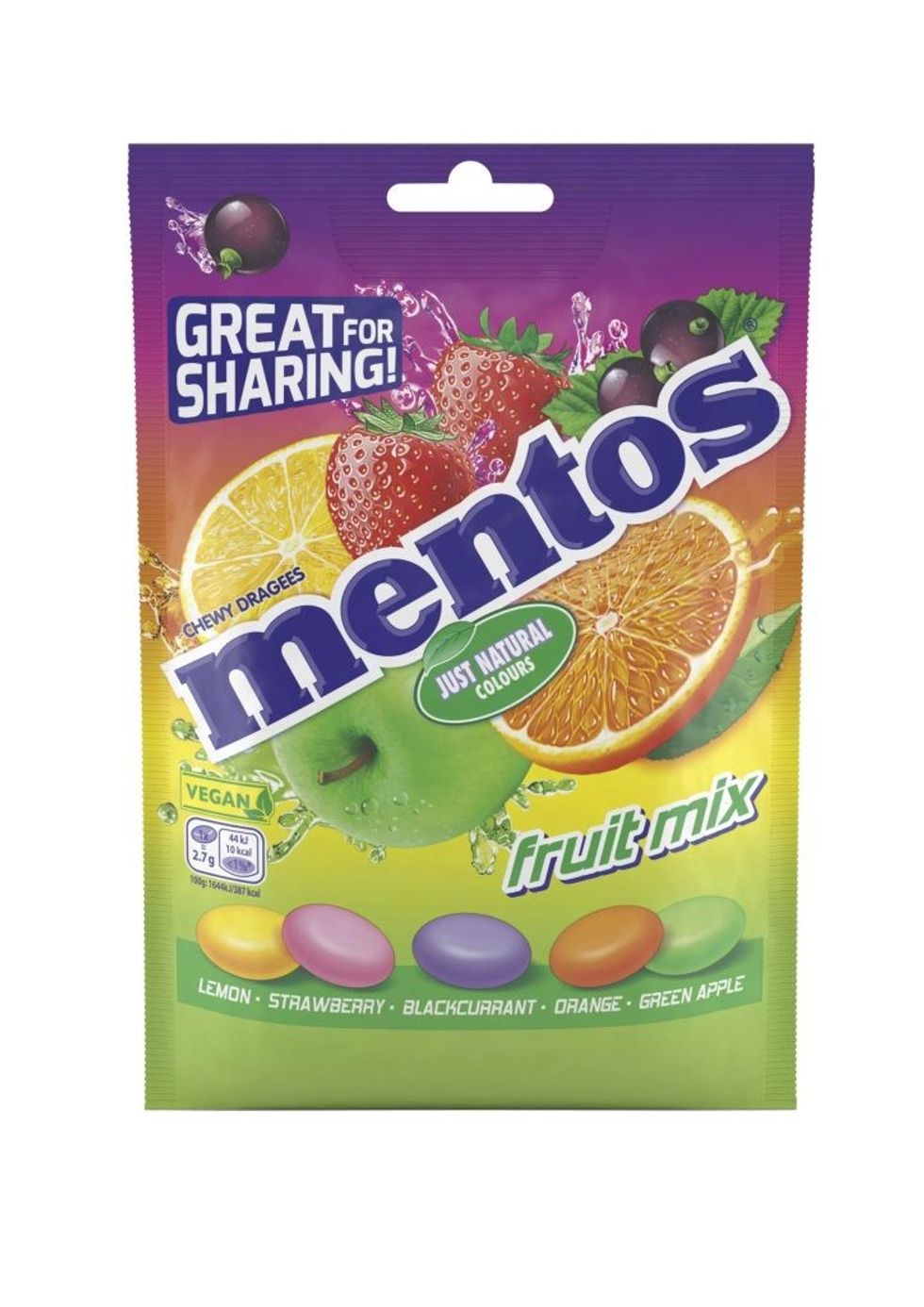Mints and gum are more than just sweets – they give a feeling of freshness, invigoration and energy – no wonder they are such an impulse hit
Mints and gum are the perfect category for small shops, as demonstrated by the category's close proximity to the till. It is a vibrant section with great margins and a never-ending supply of NPDs – new flavours, form and packaging – happily straddling several categories. More importantly, independent retailers can gain ground over the multiples with mints and gum due to its highly impulsive nature.
“Sugar confectionery is a resilient category as it delivers lifts and treats for its consumers. As we continue into a challenging economic landscape, confectionery remains an affordable treat giving retailers a compelling sales generator,” comments Mark Roberts, marketing and trade marketing director at Perfetti Van Melle (PVM).
Treating and snacking in the UK market is worth £13.3bn. Within this, confectionery is worth £5.5bn and driving growth. 75 per cent of treats and snacking growth has come from confectionery sales alone [Nielsen, 2022] and incremental sales remain strong, with two-thirds of products bought on impulse.
Lucy Sherlock, Extra senior brand manager at Mars Wrigley, says fruit flavours including favourites such as strawberry, orange and lemon remain popular choices in the fruity confectionery and gum sectors.
“We can expect to see variations and combinations of these, as well as the tropical flavours such as pineapple, mango and passionfruit, growing the market in 2024,” she notes.
In response to the surge in the popularity of fruity gum, now the fastest growing gum segment, Mars Wrigley has launched Extra Sugarfree Watermelon, a new gum innovation, nationwide. Backed by a £2.1m media campaign supporting the total fruit range including Refreshers, this is their first-ever Watermelon flavour.
“Over-indexing with millennials and Gen Z audiences, fruity gum is the fastest-growing gum segment with a 25 per cent increased rate of sale,” Sherlock says. “A third of fruity gum shoppers only buy fruity gum, and 70 per cent of fruity gum growth has been incremental to the gum category. Watermelon meets current consumer preferences while attracting a new, younger audience with an expanded range of fruity flavours.”
Extra Sugarfree Watermelon bottle (RRP £2.75) and single packs (RRP £0.65) are currently rolling out nationwide following its exclusive launch into Tesco last year.
The latest NPD follows from the launch of Extra Refreshers Strawberry Lemon last year.
“This launch was based on insights that show strawberry is the most popular flavour within fruity confectionery, accounting for four in five fruit NPD. It is also the flavour responsible for the most category-wide repeat purchases. Combining strawberry with a lemon twist, the No 1 and No 2 flavours for consumer loyalty, represents a refreshing move to innovate the fixture and excite new shoppers,” Sherlock says.
Extra gum is sugar-free and therefore the brand is not affected by the HFSS regulations and is still available at the till point.
PVM’s Mark Roberts says their leading brand, Mentos Pure Fresh Gum, has gone from strength to strength, with a real focus on fruit flavours, which drives new teenage and young adult shoppers into the category.
“Fruit gum is now worth £33m, +26 per cent versus last year, and in fact Mentos is driving two thirds of the growth of the fruit gum market,” he notes.
“Cherry and Tropical flavours along with Bubblefresh continue to accelerate growth, and we see lots of opportunity to grow this further among the 30 million Brits that chew gum. We are continuing to tap into the ‘Gen Z’ audience with activity led by TikTok social campaigns, VoD, OOH, PR all year round.”
Eco-conscious
Strengthening its sustainability credentials, Mentos Pure Fresh Gum is now available in a paper bottle, the first paper bottle in the confectionery industry, which will reduce the plastic in Mentos Gum packaging by 93 per cent.
The new bottle made with paper launched in stores in November 2022, across the full Mentos Pure Fresh flavour range of Cherry, Tropical and Fresh Mint. The launch was further bolstered by a bumper £1.5m ATL campaign last Summer.
“Landing Perfetti Van Melle’s strapline ‘Yes to Fresh’, the campaign heroed all five mouth-watering flavours of sugar-free Mentos Pure Fresh Gum, championing the new, fully recyclable paperboard bottle, and encourages people to find their adventurous side,” Roberts says.
The multi-touchpoint activity ran from June to mid-September, across peak morning, breakfast and drive time on Global Capital and Capital Xtra, totalling a combined reach of 7.1m and social reach of 114.3m, with an estimated 300m impressions. Throughout June until late August, targeted ads via VOD, YouTube and TikTok drove further awareness and increased penetration amongst the key Gen Z target audience, with an estimated 13m further impressions.
The packaging innovation was crowned Product of the Year 2023, a second consecutive win for PVM. The format also went on display at London’s Museum of Brands in early 2024, further celebrating the sustainability achievements of Mentos.
Meanwhile, challenger brand Milliways, launched in 2021, is giving the gum industry something to chew on with its plastic-free, sugar free and plant-powered gum.
“Milliways is tackling a serious topic – the fact that most gum is made from single-use chewy plastic ingredients. Milliways appeals to younger consumers looking for high quality, great tasting and sustainable products,” says Andrew Bradshaw, sales director.
“Available in four long lasting flavours – Peppermint, Mighty Mint, Bubblemint and Watermelon with an RSP of £1 – Milliways will not only drive profits, it’s a great-tasting gum with zero plastic.”
In an industry dominated by legacy brands, Bradshaw says Milliways Plastic Free Gum has become the UK’s fastest growing chewing gum company within three years, thanks to its best-in-class product and rapid expansion. With a range of flavour bursting products and a recent TV advert, their gum can now be found at 6,500 retailers nationwide, and the stockists include CLF, Diverse Fine Food, Delicious Ideas, Booker Wholesale and Faire.
In April, PVM’s Fruit-tella, which announced the transition to a fully vegan recipe last October, has expanded its chews range with new Berries & Cherry Stick.
Following the success of the Berries & Cherry170g sharing bag, Fruit-tella is expanding the format of these beloved chews, now returning in single stick form, ideal for consumers looking to take their favourite snacks on-the-go.
Each stick, consisting of 10 individually wrapped chews, offers bites of “fruity joy” in Blackberry, Raspberry and Cherry flavours.
Made with real fruit juice, all-natural colours and flavours and utilising Fruit-tella’s new vegan formula, Fruit-tella Berries & Cherry invites hungry snackers to take a moment to indulge in a feel-good treat. Adding to the product’s credentials, Fruit-tella Berries & Cherry Stick is dairy, gluten and nut-free, promoting a more inclusive snacking experience for all.
Health matters
The gum category is worth £266m and growing 18 per cent year on year [IRi Unify 52w/e 31.12.22]. Roberts says Mentos Gum is outperforming the category (34 per cent), driven by phenomenal annual sales and the launch of Mentos Pure Fresh Gum in paper bottles.
“We’ve seen fantastic performances across our portfolio-leading Mentos Gum to be the number three brand within the category. Routines have most definitely changed, but the need to be ready, alert, take time for yourself, and feel fresh are as important as ever. Being sugar free, both Smint and Mentos Gum are HFSS-compliant, which is important for retailers after the legislation introduction in 2022,” he notes.
He adds that PVM’s focus is on driving choice and they will continue to bring a wide range of products to consumers with new flavours, packaging, and textures.
Health concerns still remain a priority for all, and Roberts highlights that PVM’s sugar free alternatives allow people to make their own choices.
“Perfetti Van Melle remains the leader within the sugar-free category, with sales continuing to grow. Confectionery is one of the top five categories purchased on impulse in convenience stores. Offering a full range that supports the government’s HFSS guidelines of under 150kcal per pack – something most manufacturers can’t, gives Perfetti the opportunity to be closer to these impulse purchases,” he notes.
He recommends stocking Mentos Citrus Vitamin Gum, which is sugar free, like all Mentos Gum products, and contains 25 per cent of recommended daily vitamins B6, C and B12. The tangy liquid filled centre gives long-lasting freshness, made up of a blend of citrus flavours: orange, grapefruit, and lemon, delivering a reviving, fruity kick.
PVM’s leading sugar-free mint brand, Smint, occupies 36 per cent of the sugar free mint market [IRI, Circana, 52 w/e 02.12.23], growing at three times the rate of the category. With a value of £14.1m and a growth rate up 55 per cent, Roberts says there’s never been a better time for retailers to invest in and stock-up on Smint.
“The Smint range features a variety of popular flavours including Peppermint, Spearmint, Sweet Mint and Strawberry, which can be purchased in tin, bottle, and dispenser formats – giving consumers an instant, long-lasting burst of freshness, on the go, in the car and anywhere in-between,” he says.
Smint has also launched a new on-the-go mint, Smint Defensive, in response to the growing demand for immune enhancing products. Containing Vitamin C, B6 and Zinc, which support the immune system and contribute to the reduction of tiredness and fatigue, Smint Defensive’s sugar free peppermint lozenges join a growing Smint portfolio and are available in a widely recyclable 18-piece Flip Top Box.
Value proposition
PVM is targeting the growing sharing opportunity and a younger audience with the launch in April of two new packs – Mentos Fanta Pouch Bag and Mentos Fruit Mix Pouch Bag.
The new Pouch Bags are designed to help provide consumers with a mood-boosting moment of delicious fruity freshness to share with friends or family.
Sharing bags are the most popular pack format in confectionery, accounting for 71.4 per cent of sweet value sales [Circana Unify, L52w, L26w, L12w/e 20.01.24]. Fruit flavours are currently driving growth in sweets, whilst hard chews are growing ahead of the total category, up 17.8 per cent and now worth £71m.
Following a twice-extended production run due to its extreme popularity, The Product of the Year award-winning Mentos Fanta has been a runaway success since its initial launch in 2022. The existing Fanta Rolls and Multipack have delivered incremental sales to the portfolio, meaning that extending the format of the third bestselling Mentos flavour to include Pouch Bags was a natural next step.
Great taste is central to Mentos, which is why the brand has reintroduced its most-loved flavour roll, Fruit Mix, worth £5.1m, in new Pouch Bags. The new format will also contain the fresh addition of a Green Apple & Blackcurrant sweet to surprise and delight Fruit Mix fans further.
Earlier this year, PVM unveiled Mentos Discovery, a category-first 14 different flavour sweets in one roll, which was backed by a £1m marketing investment. The launch consolidates the recent growth of Mentos Candy, which is now a £37.3m brand, with sales up 17 per cent in the past 12 months [Circana, 52 w/e 20.01.24].
Mentos Pouch Bags (RRP: £1.50) will be supported with tactical in-store activations and POS throughout the year.
Earlier, in January this year, PVM launched a sharing bag format of Fruit-tella’s enduringly popular Strawberry chew.
The new Simply Strawberry Sharing Bags (RRP: £1.50) offer Fruit-tella’s popular strawberry-flavoured soft chew in an easy to share, individually wrapped toffee-shaped sweet, offering both hygiene and portion control. PVM said these tempting treats will make a perfect addition to a sharing bowl for the next big night in occasion, or a thoughtful seasonal gift.
Fruit-tella’s entirely vegan formula, made with real fruit juice and only natural flavours and colourings, allows children and parents alike to indulge in Fruit-tella Simply Strawberry’s all-natural fruity taste.
Not only vegan, but also dairy, nut and gluten-free, Fruit-tella Simply Strawberry makes for a more inclusive snacking experience for fans of the brand’s beloved chews.
Mars Wrigley’s Lucy Sherlock bats for PMPs as these products help independent stores to compete with multiples.
“When shopping for confectionery, convenience is key, and this goes hand-in-hand with PMPs. In fact, half of convenience baskets include PMPs. They offer shopper convenience in a number of ways: they are often positioned in easy-to-grab locations or display units which drives impulse purchase and promotes repeat purchase and they provide a clear price. The clear price display reassures shoppers of a fair cost for a high-quality product. This produces a positive price perception that in turn drives sales. In addition, stocking PMPs of new products can drive trial, and in turn form new shopping habits that can establish brand loyalty in the long-term,” she explains.
Even in times of economic uncertainty, treating and snacking remain high. However, trends in shopper behaviour are continually changing, and as the category evolves to keep consumers engaged, retailers need to adapt their ranging, merchandising, and promotion strategies to bring new people into the category.






